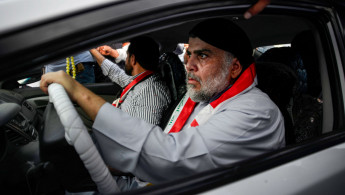Sadr's bloc calls for travel ban, trials for Iraqi officials involved in 'massacre of protesters'
Sabah Al-Saadi, an MP in Muqtada Al-Sadr's political party Sairoon, on Sunday urged the judiciary to form a court specialised in what he dubbed the "October Revolution" to hold to account the outgoing prime minister and security leaders for the violent crackdown on demonstrators across the country.
The Iraqi Council of Representatives "accepted today the resignation of the prime minister... however, this does not relieve him and his government of accountability for massacres committed against the people," a statement by the bloc read on Sunday.
Article 83 of the constitution stipulates that "the responsibility is shared between the prime minister and his government, all of whom must be held to account for their crimes", the statement added.
"The people re awaiting justice against criminals who shed Iraqi blood, especially in Dhi Qar," the statement noted, referring to the scene of a recent brutal crackdown on protesters.
The bloc also called for a travel ban on prime minister and senior security officials.
The remarks came just hours after the bloc waived its right to appoint the next prime minister, after the resignation of former Prime Minister Adel Abdel Mahdi, noting the decision falls into the hands of the people.
Read more: Kidnappings, killings and threats: Inside Iraq's authoritarian turn
Sadr's Sairoon bloc won the largest share of parliament's 329 seats in a vote last year. It gained popular support due to Sadr's Iraqi nationalist, anti-corruption and anti-sectarian platform, condemning both US and Iranian meddling in the country's politics.
Since the beginning of the revolution, the firebrand cleric and ex-militia leader has spearheaded demands for Prime Minister Adel Abdel Mahdi’s resignation and urged early elections.
He also tweeted in support of the initial six-day wave of protests that rocked the country at the start of October.
Protests erupted in the capital Baghdad and across Iraq's Shia-majority south in early October against endemic corruption, economic mismanagement and poor public services, since growing to demand the ousting of the government accused of being beholden to foreign powers.
The message came as protesters across Iraq took to the streets on Sunday to mourn demonstrators killed in anti-government rallies, even turning out in Sunni areas where people have previously avoided joining in.
Iraq’s parliament formally accepted the resignation of Prime Minister Adel Abdul Mahdi on Sunday afternoon, triggering the race to find a new leader as demonstrations rage on across Iraq.
Abdul Mahdi submitted his letter of resignation to parliament on Saturday after an uptick in bloody violence that witnessed the deaths of almost 70 demonstrators.
Najaf witnessed a fresh bout of violence in recent days as security forces and armed men in civilian clothes tried to snuff out rallies after demonstrators torched the Iranian consulate, leaving more than 20 protesters dead.
More than 20 demonstrators were killed in the holy city this week, with at least 31 more killed by security forces in the southern city of Nasiriyah, the birthplace of Prime Minister Adel Abdul Mahdi.
The demonstrations have swollen in size, scope and fury since then, with protesters targeting symbols of Iranian influence and calling for a new government.
Iraqis have been faced by a brutal crackdown in what amounts to the country's biggest crisis since Islamic State group militants seized large swathes of the country five years ago. More than 420 people killed and 15,000 wounded so far, according to an AFP tally.
Follow us on Twitter and Instagram to stay connected





 Follow the Middle East's top stories in English at The New Arab on Google News
Follow the Middle East's top stories in English at The New Arab on Google News
![The UAE is widely suspected of arming the RSF militia [Getty]](/sites/default/files/styles/image_330x185/public/2024-11/GettyImages-472529908.jpg?h=69f2b9d0&itok=Yauw3YTG)
![Netanyahu furiously denounced the ICC [Getty]](/sites/default/files/styles/image_330x185/public/2024-11/GettyImages-2169352575.jpg?h=199d8c1f&itok=-vRiruf5)
![Both Hamas and the Palestinian Authority welcomed the ICC arrest warrants [Getty]](/sites/default/files/styles/image_330x185/public/2024-11/GettyImages-2178351173.jpg?h=199d8c1f&itok=TV858iVg)